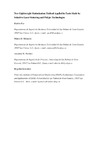Please use this identifier to cite or link to this item:
https://accedacris.ulpgc.es/jspui/handle/10553/16573
| DC Field | Value | Language |
|---|---|---|
| dc.contributor.author | Paz Hernández, Rubén | en_US |
| dc.contributor.author | Monzón Verona, Mario Domingo | en_US |
| dc.contributor.author | Benítez Vega, Antonio Nizardo | en_US |
| dc.contributor.author | González Landín, Begoña | en_US |
| dc.date.accessioned | 2016-04-20T08:31:45Z | - |
| dc.date.accessioned | 2018-03-15T14:36:25Z | - |
| dc.date.available | 2016-04-20T08:31:45Z | - |
| dc.date.available | 2018-03-15T14:36:25Z | - |
| dc.date.issued | 2015 | en_US |
| dc.identifier.issn | 0951-192X | en_US |
| dc.identifier.uri | https://accedacris.ulpgc.es/handle/10553/16573 | - |
| dc.description.abstract | The continuous evolution of materials and technologies of additive manufacturing has led to a competitive production process even for functional parts. The capabilities of these technologies for manufacturing complex geometries allow the definition of new designs that cannot be obtained with any other manufacturing processes. An application where this capability can be exploited is the lightening of parts using internal structures. This allows to obtain more efficient parts and, at the same time, reduce the costs of material and manufacturing time. A new lightweight optimisation method to optimise the design of these structures and minimise weight while keeping the minimal mechanical properties is presented in this paper. This method is based on genetic algorithms, metamodels and finite element analysis (FEA). This combination reduces the number of FEA simulations required during the optimisation process, thereby reducing the design time. This methodology is experimentally applied to a reference geometry oriented both for selective laser sintering (SLS) and Polyjet technologies. In both cases, an optimised and a non-optimised design are manufactured and tested in order to experimentally compare the stiffness results between them. The optimum design achieved a specific stiffness 72.82% higher than the non-optimised design in the SLS case study, and 3.14 times higher in the Polyjet case study. | en_US |
| dc.language | eng | en_US |
| dc.publisher | 0951-192X | - |
| dc.relation.ispartof | International Journal of Computer Integrated Manufacturing | en_US |
| dc.source | International Journal of Computer Integrated Manufacturing [ISSN 0951-192X], v. 29 (4), p. 462-472 | en_US |
| dc.subject | 331209 Resistencia de materiales | en_US |
| dc.subject | 331210 Plásticos | en_US |
| dc.subject | 331212 Ensayo de materiales | en_US |
| dc.subject | 331399 Otras (especificar) | en_US |
| dc.subject | 1206 Análisis numérico | en_US |
| dc.subject.other | Additive manufacturing | en_US |
| dc.subject.other | Lightweight optimization | en_US |
| dc.subject.other | Genetic algorithms | en_US |
| dc.subject.other | Finite element analysis | en_US |
| dc.title | New lightweight optimization method applied in parts made by selective laser sintering and polyjet technologies | en_US |
| dc.type | info:eu-repo/semantics/Article | en_US |
| dc.type | Article | en_US |
| dc.identifier.doi | 10.1080/0951192X.2015.1066033 | |
| dc.identifier.scopus | 2-s2.0-84958876985 | - |
| dc.identifier.isi | 000371035800007 | - |
| dc.contributor.authorscopusid | 56606882000 | - |
| dc.contributor.authorscopusid | 7003371153 | - |
| dc.contributor.authorscopusid | 13805747600 | - |
| dc.contributor.authorscopusid | 55643744700 | - |
| dc.identifier.crisid | 37869;2367;3450;15303 | - |
| dc.description.lastpage | 472 | - |
| dc.description.firstpage | 462 | - |
| dc.relation.volume | 29 | - |
| dc.investigacion | Ingeniería y Arquitectura | en_US |
| dc.rights.accessrights | info:eu-repo/semantics/openAccess | - |
| dc.type2 | Artículo | en_US |
| dc.contributor.daisngid | 2158374 | |
| dc.contributor.daisngid | 1363424 | |
| dc.contributor.daisngid | 579452 | |
| dc.contributor.daisngid | 7321859 | |
| dc.identifier.external | 37869;2367;3450;15303 | - |
| dc.utils.revision | Sí | en_US |
| dc.contributor.wosstandard | WOS:Paz, R | |
| dc.contributor.wosstandard | WOS:Monzon, MD | |
| dc.contributor.wosstandard | WOS:Benitez, AN | |
| dc.contributor.wosstandard | WOS:Gonzalez, B | |
| dc.date.coverdate | Abril 2016 | |
| dc.identifier.ulpgc | Sí | es |
| dc.description.sjr | 0,616 | |
| dc.description.jcr | 1,319 | |
| dc.description.sjrq | Q1 | |
| dc.description.jcrq | Q2 | |
| dc.description.scie | SCIE | |
| item.grantfulltext | open | - |
| item.fulltext | Con texto completo | - |
| crisitem.author.dept | GIR Fabricación integrada y avanzada | - |
| crisitem.author.dept | Departamento de Ingeniería Mecánica | - |
| crisitem.author.dept | GIR Fabricación integrada y avanzada | - |
| crisitem.author.dept | Departamento de Ingeniería Mecánica | - |
| crisitem.author.dept | GIR Fabricación integrada y avanzada | - |
| crisitem.author.dept | Departamento de Ingeniería de Procesos | - |
| crisitem.author.dept | GIR SIANI: Computación Evolutiva y Aplicaciones | - |
| crisitem.author.dept | IU Sistemas Inteligentes y Aplicaciones Numéricas | - |
| crisitem.author.dept | Departamento de Matemáticas | - |
| crisitem.author.orcid | 0000-0003-1223-7067 | - |
| crisitem.author.orcid | 0000-0003-2736-7905 | - |
| crisitem.author.orcid | 0000-0001-5711-6395 | - |
| crisitem.author.orcid | 0000-0002-7915-0655 | - |
| crisitem.author.parentorg | Departamento de Ingeniería Mecánica | - |
| crisitem.author.parentorg | Departamento de Ingeniería Mecánica | - |
| crisitem.author.parentorg | Departamento de Ingeniería Mecánica | - |
| crisitem.author.parentorg | IU Sistemas Inteligentes y Aplicaciones Numéricas | - |
| crisitem.author.fullName | Paz Hernández, Rubén | - |
| crisitem.author.fullName | Monzón Verona, Mario Domingo | - |
| crisitem.author.fullName | Benítez Vega, Antonio Nizardo | - |
| crisitem.author.fullName | González Landín, Begoña | - |
| Appears in Collections: | Artículos | |
SCOPUSTM
Citations
9
checked on Jun 8, 2025
WEB OF SCIENCETM
Citations
11
checked on Jun 8, 2025
Page view(s)
199
checked on Sep 27, 2025
Download(s)
363
checked on Sep 27, 2025
Google ScholarTM
Check
Altmetric
Share
Export metadata
This item is licensed under a Creative Commons License


